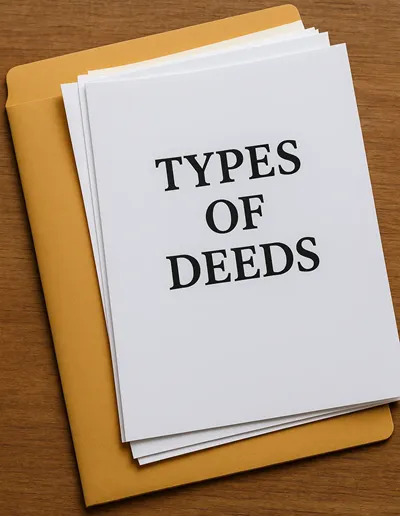
Types of Deeds
| Deed Type | Purpose |
|---|---|
| Sale Deed | Transfers ownership of immovable property (land/house/flat). |
| Gift Deed | Transfers property without monetary consideration. |
| Relinquishment Deed | One heir surrenders his/her share in inherited property. |
| Partition Deed | Divides property among co-owners. |
| Mortgage Deed | Property pledged as loan security. |
| Lease Deed | Grants possession of property for a fixed time in exchange for rent. |
| Trust Deed | Establishes objectives, duties, and rights under a trust. |
| Adoption Deed | Records the legal adoption of a child. |
| Will | Specifies distribution of property after death. |
| Development or Exchange | Transfer for development or swapping property. |
Documents Required
Common across states:
- Identity/address proofs (Aadhaar, PAN, passport)
- Property ownership proof (title deed, RTC/Parcha/Khata)
- Latest property tax receipts
- Passport-size photos
- Encumbrance Certificate (EC)
- Stamp duty & registration fee challan
State-specific examples:
- Maharashtra (igrmaharashtra.gov.in): Original deed, photo IDs, POA copy (if applicable), proof of stamp duty payment, appointment receipt.
- Sikkim (mangan.nic.in, namchi.nic.in): Sale deed + spot verification, COI, seller affidavit, parcha, Dhan Rasid. Mortgage deed requires a bank letter and NEC. Lease deed requires industry consent and a Pollution Control Board NOC.
Fee Structure
Uttar Pradesh (igrsup.gov.in)
- Sale Deed: 7% (men), 6% (women), 6.5% (joint) + 1% registration fee.
Other Deeds:
- Gift: ₹60–125
- Lease: ₹200
- Will: ₹200
- GPA: ₹10–100
- Adoption: ₹100
- Divorce: ₹50
Odisha (igrodisha.gov.in)
- Adoption (simple): ₹250 + ₹300 registration
- Adoption with property: 5% of property value + 2% registration
- Agreement of Sale with possession: 5% stamp duty + 2% registration
- Affidavit: ₹10 only
(Similar fee tables exist in every state, but percentage/flat fees differ.)
Online Process
- Draft deed entry (Maharashtra Public Data Entry, Telangana online draft).
- E-stamping via SHCIL
- Fee payment online.
- Appointment booking at the Sub-Registrar Office.
- Final step: Parties appear in person for biometric capture, thumb impression, photo, and signing.
Key rule: Registration can never be fully online. Presence at SRO is compulsory.
Common Mistakes People Make
- Not checking property encumbrance before the sale deed.
- Incorrect stamp duty or underpayment → deed invalid.
- Skipping witness signatures.
- Not updating mutation/Khata after registration.
- Using unregistered deeds where registration is compulsory.
- Not carrying original property papers at SRO.
FAQs
-
Q1. What is a deed?
-
A legal document that records the transfer, creation, or surrender of rights in property.
-
Q2. Is a sale deed compulsory?
-
Yes. Without a registered sale deed, ownership does not pass to the buyer.
-
Q3. Can I gift property without registration?
-
No. Gift deed must be registered with stamp duty paid, or else it is invalid.
-
Q4. What is the difference between a sale deed and a conveyance deed?
-
Sale deed is specific to a sale, while a conveyance deed is a broader term for any transfer of ownership (sale, gift, or exchange).
-
Q5. Do all heirs need to sign a relinquishment deed?
-
Yes, all co-heirs must consent for validity.
-
Q6. Can a lease deed of 11 months be unregistered?
-
Yes, leases under 12 months usually do not require registration, but rules vary by state.
-
Q7. What is an Encumbrance Certificate (EC)?
-
A record showing whether property has any legal dues or loans.
-
Q8. Can I prepare a deed online?
-
Yes, draft and fee payments can be done online, but final signing needs in-person registration.
-
Q9. Is biometric verification compulsory?
-
Yes, all parties must be present for biometrics and photos at the Sub-Registrar’s office.
-
Q10. What if I don’t register a deed?
-
Unregistered compulsory deeds (like sale, gift, or mortgage) are not legally valid.
-
Q11. Who pays stamp duty in a sale deed?
-
Generally, the buyer. But it can be agreed otherwise.
-
Q12. Are stamp duties the same in all states?
-
No. Each state fixes its own rates.
-
Q13. Can women get a concession in stamp duty?
-
Yes, many states (like UP, Delhi, and Haryana) give 1–2% lower stamp duty for women.
-
Q14. Is a will registered?
-
Registration is optional but recommended for proof.
-
Q15. What is the validity of an adoption deed?
-
Once executed and registered, it is permanent.
-
Q16. What if stamp duty is underpaid?
-
Registrar will not register. Even if overlooked, a later deed can be challenged.
-
Q17. Can deeds be cancelled?
-
Yes, through a registered cancellation deed if both parties agree, or by court order.
-
Q18. What is mutation after a sale deed?
-
Updating land records (municipality/revenue office) in the buyer’s name.
-
Q19. Can NRIs execute deeds in India?
-
Yes, through Power of Attorney attested at the Indian Consulate, then registered in India.
-
Q20. Where can I check deed status?
-
On respective state IGR/Registration websites (e.g., igrmaharashtra.gov.in, igrsup.gov.in, igrodisha.gov.in).
Add new comment